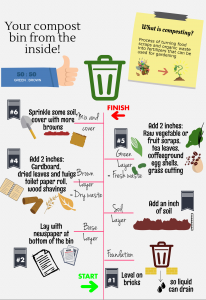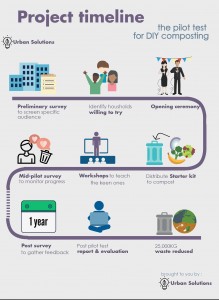I am an ordinary urbanite like you. I just wish to share about my personal journey with food waste, and what i think anyone and everyone can do about it.
I grew to be more respectful of food ever since my experience in dumpster diving and a farm stayover with a group of hippies (while in Sweden for my exchange). Many of my Singaporean friends were disapproving, or at least sceptical of picking food from the dump, it was purely fun and experience for myself to do that, and of course, free food! I remembered getting “scolded” in the kitchen when i cut away bruises of the ugly apple away, and unknowingly “wasting” some parts with my generous cut. Hippies described me as “city kid” and “too picky” about how the apple looks.

My partner-in-crime digging in the dumpster

My prized loot – do they not look edible to you?
Bringing back to home, i feel that what is missing in current measures is the lack of connection between people and the food waste. I don’t feel pain for the food i am wasting when i didn’t see for myself one huge truck of food wasted almost every night by the supermarket i frequent. This video describes the consumers’ standards of vegetables and thus 1 quarter of the fresh produce which does not make the mark gets thrown away.
National Environmental Agency (NEA) is encouraging food recycling in hawker centres (pilot testing stage) and pushing hotels and shopping centres to report food waste figures while private firms starting to adopt the idea of donating excess food (e.g. via FoodBank). ZeroWasteSG is encouraging donation / distribution of excess food by food caterers and restaurants and SaveFoodCutWaste is increasing public awareness to reduce food waste upon consumption.
Are these measures too unrelatable to the masses? Is food waste none of my business? It is easy for the masses to think of food waste this way since most are not involved in these measures at all.
Sometimes the simplest solution could solve the most complex issue.
Small simple efforts can begin from YOU AND ME !
As our group (Urban Solutions) have presented our business proposal on DIY composting kit. Judging from the positive feedback, we hope we have succeeded in inspiring some people to take action, to help make our city more sustainable by closing the loop of the ecosystem. 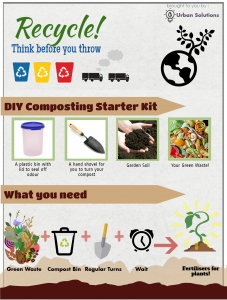
I started off experimenting in February with composting by simply burying (hiding it from the birds or insects) some chopped up orange peel and banana skin in the soil of my potted mint leaves. I got hooked up from there because it was amazing to see the buried materials DISAPPEAR and make my soil smells fruity (citrusy).

Banana skin – into the soil !
I got greedy. I want to do MORE COMPOSTING.
Because composting:
- Is fun when my waste “disappear” (my apple core disappear in 3/4 days)
- Return nutrients back to the Earth for my garden plants
- Makes me feel good when I generate less trash (I recycle 30% of my kitchen waste and 99% of my garden waste)
- Is so simple (thrown in the waste and you are done)
When an organic material is incinerated and ended up in a landfill, we waste a valuable resource that is rich in nutrients. Composting helps to digest and process this material into the soil ready to be utilised by plants.
A small spending of $7.50 for a plastic bin goes a long way. I got a 30cm (height) x 28cm (diameter) bin with lid. You can get a transparent one at various prices if you wish to see what happens on the inside without having to open the lid.

Bin with lid with manually drilled holes
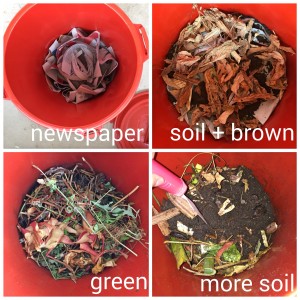
Steps taken
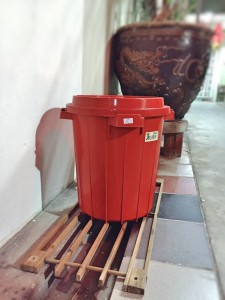
Placed along the corridor
Steps taken:
Purpose of adding soil is to activate the composting process using the living bacteria already present in the soil.
Covering the waste with soil is mainly to prevent pest (e.g. flies) to come.
General rule of thumb is to make sure you have 50% brown and 50% green everytime you add new waste. When I had too much green waste, i find water droplets forming on the lid, which indicates that it might be too wet, and more brown (e.g. dried leaves) should be added.
It is fun as you try to very resourceful and experiment what you add in and observe them. I would add in waste about every day or every other day. If you do not have time to add in regularly, it is fine. It will decompose whatever is already added.
Having experienced this personally, I strongly think that providing a DIY household composting kit will be a good start to help bring down green waste in households, in a cost effective way. More importantly, it educates the public and helps to reconnect the masses with their own food waste generated from the kitchen. We are hoping to take this proposal (Pilot test household DIY composting: Slides here >> LSM4265 Food Waste & Composting Slides ) to NEA.
P.S. As environmental biology/ BES students, I strongly urge you to give it a try and explore the possible materials to use for composting. Me too, continuing to have fun experimenting.
Signing off (with love and hope)
Mioa Shan
